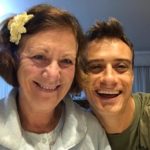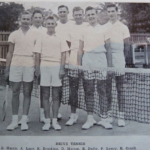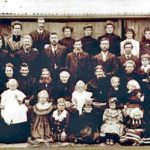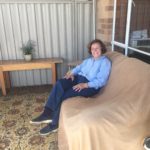When Joseph Henry (Harry) Dangerfield married Emma Emelia Laube he married a real treasure. Emma was a kindly woman, good-natured and even-tempered. She was imbued with the strong Lutheran values of her Silesian ancestors, and is remembered by her family as a brilliant cook using recipes lovingly passed down to her from her German grandmother, Dorothea.
Harry too was a man of great character. His strength and diligence were developed on the family farm, firstly on the West Coast of South Australia and later in the Mallee region at Pinnaroo. He was also a loving husband and a good match for his wife, Emma. Emma and Harry provided a haven and safe place for many over the years. When my grandmother Alice Maud Williams died, Harry and Emma welcomed grandfather Joseph Dangerfied and Maud’s youngest daughter, my Auntie Ronda, into their home at Gawler and cared for them both as part of their family. They also accepted their son Ivor (Bill) Dangerfield and his daughter, Marilyn, when they needed a place to live when Bill’s marriage broke up. To gain additional insight into the family history I have chosen to visit Ev Gore, Emma and Harry’s daughter. It is a Friday in May 1972 and Friday is always baking day at the Gore home located at 20 Hawkins Ave, Flinders Park, Adelaide, South Australia.
When my Aunty Ronda went to live with the Dangerfield’s she was only 7 years of age whilst Ev Dangerfield, her first cousin, was about 17 years old. I am hoping that Ev, now Ev Gore, will share memories of her parents that may have been missing in Ronda’s story. It is just a year since Ev’s Mum, Emma Emelia Dangerfield (Laube) died and I am sitting in Ev’s kitchen where she has just finished her weekly bake. The tables are filled with pies, pasties and sausage rolls; staples in the Gore household. A second table holds all of the “Deutsche Kuchen,” sweet cakes, puddings and biscuits made from recipes passed on to Ev by her mother and grandmother.
“Would you like to try a sausage roll Fay?”
“I certainly would, Aunt Ev. Thank you. I can’t believe this is your weekly bake. So much food!”
“When you have four sons who have bottomless pits for stomachs, you have to do a lot of cooking. But I don’t mind cooking, it’s what I have always done and it is what my mother did before me and her mother before her too. It’s all in our Germanic heritage, good German cooking, ‘Deutsche Kuchen.’”
“What I really can’t work out Aunt Ev, is how your sons are all so thin when they have this feast set before them each Friday! ”
Ev laughed. “I don’t know why they are not fat. I guess they must work hard and play lots of cricket and other sports and have good metabolisms, I guess and use it all up in energy. Of course, we have visitors most weekends and so the boys aren’t the only ones who eat all the food. We have a lot of fruit trees in the garden and we have a cellar and so I do what my mother taught me, I preserve the fruit or make it into jam and make lots of pickles as well. That’s the way I make sure that we don’t have to spend too much money on food and are able to afford to be hospitable.”
“It takes a lot of work to be hospitable doesn’t it and your mother set a very high standard of hospitality and generosity. She would have been ‘a hard act to follow.’”
“She was. Although I wasn’t too appreciative of that fact at the time, but she certainly trained me well and these days it is all second nature to me. But I do love cooking. Good food, good cooking is ‘in my blood.’”

Harry and Emma Dangerfield with Rhonda Williams in the middle and Ev Gore (Dangerfield) on the right.
“ Aunt Ev, could you tell me a bit about your Mum and Dad, what were they like? I know that Harry and Emma met in 1903 when their families took up adjoining farms at Kopppio and that on 21st April 1909 Harry purchased land at Parilla Well near Pinnaroo and lived and farmed there until he married your mother on 5th Oct 1910 at Caltowie. I believe you lived in Pinnaroo from 1910 to around 1920. Can you tell me what happened around about that time?”
“My father purchased the land at Parilla Well then later in 1911 his father Joseph on 24th Aug 1911 purchased the adjoining land holding.
At this time my brother Lance, their eldest son was born at Jamestown and my mother traveled back to Caltowie by train to be with her mother Pauline Laube for his birth. While our house was being built, Dad and Mum lived in an iron shed next to Grandma and Grandpa, Joseph and Margaret DAngerfield’s home.
Uncle Howard, Harry’s brother and his brother-in-law Fred Arthur, helped in the building of the house and the development of the farm. All the Dangerfield men were very clever and inventive and physically, very strong. They dug limestone from the property for the walls and burned it in a simple furnace to make lime for the mortar. From the very beginning Mum was very resourceful and seemed to rise to every eventuality; once when Lance fell into the deep lime pit close to their home she rescued him and another time she protected the family single-handedly when a drunken farm hand entered the house with a loaded shotgun and threatened to kill Harry.”
“She must have been a strong woman!”
“Mum wasn’t so much physically strong but mentally strong, yes”.
“It was a tough life clearing the scrub, burning and grubbing out stumps and coping with dry times that were so common in the Mallee. When Lance and Geoff were still just little boys they often went into the paddock with hoes cutting down scotch thistles and firing mallee roots after Harry had ploughed a paddock.
Times were hard on the farm and every bit of help was valuable, even that of young children. Lance used to help his Dad load bags of grain in the paddock onto the wagon. He had the job of leading the old horse, Dobbin, pulling a bag lifter while Dad was on the wagon stacking the bags. Lance found it hard to hold Dobbin in check and he often had to put up with the horse stepping on his toes as a result. The wagon-loads of bags would be taken into Chandos or Pinnaroo for loading onto the train.
“Lance and Geoff also helped Mum by doing the separating after she had milked our five cows twice a day. I remember Mum saying that from the time when Lance was barely able to walk, he used to help Dad on the farm and Lance has vivid memories of the farm during those early years at Parilla Well.
They had a dog called Rover that Dad would send out each morning at 4am to fetch the draught horses for the day’s work. Lance and Geoff spent a lot of time together wandering around the farm, occasionally getting into mischief. On two occasions they damaged the roof of the wash house by jumping on it and partly flattened the heap of cockie chaff covered with straw to keep out the rain. Events like this always raised Dad’s ire and earned my two brothers a good hiding.”
“There seem to have been more drought than good years at Pinnaroo, would that be correct?” I asked.
“Yes, but there were occasional bumper years in the Mallee. One such season was 1915/16 when Dad reaped 5,000 bags of wheat and 3,000 bags of oats. But just before we sold the farm in 1920 only 19 bags of wheat were reaped from the 600 acres that had been sown.
My mother was a wonderful woman. She bore and looked after five children on the farm. She prepared meals for Harry and any workmen on the farm and it was also her job to milk the cows. Rover the dog not only brought in the draught horses each day, but also the cows twice a day. Dad used to boast to anyone who would listen that Rover was as good as any farm worker. Dad built a number of houses in the Parilla and Pinnaroo area and despite the long hours of farm and building work, Dad was a keen cricketer and for a number of years played for Pinnaroo, receiving a trophy as the best all-rounder. He was outstanding as a fast off-spin bowler.
On 16th Dec 1918, at Pinnaroo, my brother Ivor Ronald (Bill) Dangerfield was born. Bill was Dad and Mum’s youngest child. Dad and Mum were on the farm at Pinnaroo until around 1920 but then the doctor advised Dad that he should give up farming and his other work and take a rest because of his ill health. Around August 1920 the farm was sold and we had a big clearing sale of all the plant and animals. Dad and Mum and the five children caught the train to Adelaide where we stayed for a short time with the Briggs family in Moon Street. We then moved to Caltowie where Mum had grown up and stayed with her mother and renewed family acquaintances with Mum’s sisters – Annie who lived with her mother, Lydia, who was married to Jack Hartwig and Susie who was married to Havelock Crawford and so we were all able to get to know some of our first cousins.
“After holidaying at Caltowie for a time, Dad and grandpa Dangerfield decided to again take up farming. At the end of 1920 they purchased a farm of about 205 acres on the northern side of the Gawler River opposite the town of Angle Vale. The property was on the flood plain of the Gawler river and consisted of Sections 20 and 105, Hundred of Port Gawler. The soil on the new farm was rich and productive from periodic flooding. Harry put in stand three Ridd milking machines and the family milked about 30 cows. Mum did her share with the help of brothers, Lance and Geoff. The milking shed had a straw thatched roof with a feed trough and six bails for holding the cows. The milking plant was driven by a McDonald’s super diesel engine run on heavy duty kerosene with the exhaust pipe sticking up through the roof. One Saturday morning hot soot from the exhaust set fire to the shed. Although the milking plant and the separator room were saved the cows had to be milked by hand until the dairy was rebuilt.”
“I can’t imagine how you coped with all the extra work that fire would have caused.”
“Yes, that was hard enough and we probably would have continued with the dairy in spite of such a setback, but the biggest setback came in 1922 when Geoff was seriously injured in a fall from his horse while bringing in the cows. Mum and Dad knew that they couldn’t cope with all the work as well as nursing Geoff so they sold the farm and purchased a house at Blanche St, Gawler. Dad started working building houses with his brother Charles. They manufactured concrete blocks and used them in building houses. Dad also bought 4 old houses to renovate and when he had completed them to his satisfaction, he rented them out.
“Some time before Dad and Mum moved to Gawler, Dad had begun studying the Bible with his brother Charles, Charlie Briggs and James Mansfield. By the time we had moved to Gawler, Dad decided to be baptized and so on 22nd June 1922 at the age of 44 years, Dad was baptized. Twelve months later on 19th June 1923, after shifting to Gawler, Mum was also baptized and both Mum and Dad became staunch members of the Adelaide Ecclesia, traveling to Adelaide once a month for meetings and Sunday School.
“Geoff and Roy also were baptized and for some years Mum ran a small Sunday School for three of her grandchildren. Mum’s and Dad’s home at Gawler was always open to visits from family and friends. The Crawford family has vivid memories of Christmas holidays at Gawler and the four Dangerfield boys had friends from Adelaide who visited at weekends. Pillow and water fights were the order of the day. Mum’s hop beer and huge delicious meals made our home a delight to visit. Mum was much loved by all who knew her particularly by her children and grandchildren and even the neighbors sought her skills with natural cures for all sorts of common ailments. She was one of those unflappable people who could cope with an invasion of up to 14 grandchildren running wild in and around her house without a sign of distress or complaint.
“What a wonderful picture of home life all that presents. What else happened while you lived at Gawler?”
“Well, in 1924 Dad bought a T-Model Ford Tourer from Gilbert Motors on the corner of Murray and Cowan Streets, Gawler. We loved that car and went on many trips in it, especially to Port Gawler on crabbing expeditions at weekends and to Jamestown and Caltowie during school holidays to visit Mum’s relations.
The roads back then were just dirt and the trip to Jamestown took most of the day. Dad would strap the luggage to the running boards and Mum would pack a picnic lunch and we would have a picnic at the half way mark. Dad was always one for taking shortcuts and it was on one of these ‘short cuts’ between Spalding and Clare that we came across a flooded creek which Dad promptly attempted to cross. Inevitably the car stalled in the middle. Grandpa Joseph, who was on this particular trip, lifted the children out of the car onto a log, while Dad found and commandeered a draught horse from a nearby farm and used it to pull the car out of the creek.
On another trip the exhaust fell off the car and we had to bypass all the towns on the way home because of the noise of the exhaust. This of course extended by hours the already long trip home. On these trips I used to sit between Mum and Dad in the front seat while my four brothers were squeezed across the back seat kicking and fighting. I don’t know how Dad and Mum put up with them. I do remember that at school over these years I used to play basketball and tennis and when I left school, I played for local clubs.
“Tell me about when my Aunty Ronda Critchley came to live with you at Gawler?”
“Dad, had two sisters, your grandmother, Alice Maud (Maud) and Elizabeth Lillian (Bessie) and both died of tuberculosis; Bessie in 1917 and Maud in 1931. Bessie and her husband Fred Arthur had five children; Fred, Charles and twins Eunice and Howard. Maud married Richard Pryor Williams and they had three children, Jean, your mother, Connie and Ronda.
“When the Grandma and Grandpa Dangerfield sold the farm and left Pinnaroo, they moved in with Maud and her family. Grandpa then purchased a house at Goodwood where he and Grandma intended to retire, but then grandma died suddenly in 1922. Grandpa didn’t want to move into the house by himself so he sold it to my Uncle Charles Dangerfield and continued to live with Maud and her family. Jean was about 17 years of age when Maud died in 1931 and Connie was 11 years old and Ronda was 7 years old.
After Maud’s death, Grandpa Joseph and Ronda came to live with us at Gawler but Ronda became really disturbed and homesick for her home at Pinnaroo. She was so unhappy that in the end Mum and Dad sent her back to Pinnaroo to stay with her father and Jean but when Jean married Maynard O’Connor in 1934 and Ronda’s Dad and Connie moved to Adelaide, Ronda had to come back to live with us at Gawler.
“What was it like having Ronda living with you at Gawler?”
Ev sighed. “I found Ronda a real trial. Grandpa adored her and spoiled her rotten. If she was in trouble with anyone in the family and she often was, she would run to Grandpa and jump on his lap for protection from me or my brothers. Mum was so busy that she didn’t have much time for Ronda and I found myself responsible to keep her in line, but I was also expected to teach her everything she was supposed to know. She didn’t want to take it from me because I ‘wasn’t her mother,’ and if she did something wrong, it was me who was in trouble with Mum.
I think Mum felt sorry for her and didn’t want to punish her herself, so it was easier for her if I did the discipline and told her off. Sometimes I felt as though I was the ‘whipping boy.’ Not only was being responsible for Ronda a trial for me but before she came to live with us I had a room all to myself; now I not only had to share my room with Ronda, but also my bed! How would you feel if you were 17 years old and had to share a bed with a spoiled seven year old. I felt it was a dreadful imposition and an invasion of my privacy. When you are going on eighteen years of age, the last thing you want is some feisty little girl in your room. I had nowhere to go where I could enjoy my own space. I felt that I spent all my time saying ‘Don’t do this’ or ‘Do do that.’
“The boys didn’t help much either. They were not expected to do a thing in the house; that was women’s work and so I was expected to do everything for them, cook, clean, the lot and my brothers were a demanding lot. I had a heavy workload and I used to get mad at Ronda because she was like a little princess in our family and as I have said before, she could do no wrong in Grandpa’s eyes. He liked her a lot more than he liked me.” Ev said a little wistfully.
“It wouldn’t have been easy for you, that’s for sure.” I said.
“My Mum had the Germanic nature. She seemed born to hard work. She also had a pleasant easy-going way with her and she loved looking after everything in the home. I didn’t inherit her nature! I think I had more of the Dangerfield in me and I could be grumpy and hot-tempered at times. Still, that was the way it was.”
“Were you good at sport? I know the Dangerfield men are all good at sport, aren’t they?”
“I was pretty good at sport too. I used to love to play tennis. Roy loved sport of any kind and played cricket for many years as well as football for Gawler Centrals. He played with his brother Bill. After playing in the 1936 Premiership side for Gawler Centrals they were both asked to play for Port Adelaide. They played together in the 1938 grand final which Port Adelaide lost and then they played in the 1939 Premiership side. When Roy finished playing with Port Adelaide he returned to Gawler and played another season with the Willaston club.
“Tell me about the refuse business your Dad purchased.”
“In 1924 Dad purchased a refuse business owned by Rodgers and Brewster. He bought it from Mr Rolly Brewster. The business was based in Ackland Street in Adelaide and the plant consisted of a tip dray, a few horses and a one ton Ford truck that was used for removing rubbish from various businesses. The rent for the premises was 5 pounds per week until the depression arrived in 1928 when Dad rented a property at Gilberton from Mr John Bickle for 30/- per week including tipping fees.
Dad would get up early each morning and catch a train to Adelaide at 5.45 am for the start of work at 8 am. My brothers Lance and Geoff traveled with him once they took jobs in Adelaide. In 1936 Roy met Shirley Rice and after a 6-year courtship they were married in Adelaide on 30th May 1942 at the Christadelphian Temple on Halifax Street. By this time Roy was working with Dad in the business as well, but then it was just after Roy got married that in 1942 during World War 2, Dad had a severe stroke and could not work again.”
“How awful. How did the family manage to keep the business going during this time?”
“To keep the business going and to help support Mum and Dad, Lance joined Roy and together they ran the business. Roy and his new wife Shirley rented a flat in St Peters and then moved to 21 Gilbert Street, Gilberton. Their next move was to 53 Gilbert Street where the business was operated until the land was acquired by the St Peters Council after a long court case that finally went to the High Court of Australia. They then bought a property at Prospect Road Extension, Gepps Cross and operated from there for a number of years until Roy retired. Roy and Shirley’s sons, John and Rex joined the business after Roy retired.
“How did your Mum cope after your Dad had the stroke?”
“Dad lived the remainder of his life at Gawler with Mum and for 15 years Mum nursed Dad. While Dad could shuffle along Mum would get Dad to stand in a shallow tub whilst she washed him down and later when he was totally bedridden she would wash him whilst he was in bed. The water had to be heated in a wood copper and Geoff, who also lived at home on Blanch Street and understood the nature of suffering, was a constant help with Mum’s care of Dad. Mum cared for Dad so tenderly, she had such tenacity, loyalty and faithfulness. There was no one quite like my Mum. Mum also cared for Marilyn, Ivor’s (Bill) daughter when they both moved in with her in 1948, this was despite the demands placed on her by Harry and the fact that she was well into her 60s. Marilyn has many happy memories of life with Mum in our lovely old house at Gawler. Despite Dad’s condition, he would entertain Marilyn for hours on end reciting poetry and telling stories and Mum also used to tell Marilyn stories about her life at Pinnaroo on the farm with her brothers.”
“When did your Dad die, Ev?”
“Dad died on 16th Oct 1956 at Willaston and was buried at the Willaston cemetery. Mum continued to live in the family home at Gawler and continued to care for Marilyn. Geoff and Ina lived just down the road with their children, Helen and Margaret. Mum was never left out of the family holidays at Pondalowie Bay where she used to love to read, sew and paddle in the water alongside the children. On one of the Pondalowie trips while the men were out fishing a snake came to the back door and Mum just got the axe and chopped its head off while everyone else stood on the table and screamed.
“And when did your Mum die?”
“One day Mum suffered a fall at home and broke her hip and spent 6 weeks in hospital. Len and I took her to our home after that and she stayed with us until she died in 1971 at the age of 87 years. We buried her with Dad in the Willaston cemetery. Our family will always remember our wonderful Mum. She did so much for all of us and for so many others as well. She always kept herself busy in the home and took great interest in the care of all of her children and grandchildren.” Ev sighed, and I knew she was looking back into the past and remembering all the early years.
“I think all your family’s Silesian forbears could be very proud of Emma Emelia Laube and all your English forbears would be proud of Joseph Henry Dangerfield!” I said.
I said goodbye to my mother’s first cousin, Ev Gore. I thanked her for her hospitality and a chance to taste her beautiful ‘Deutsche Kuchen’ and returned once again to my own life and my own time back in 2012.










